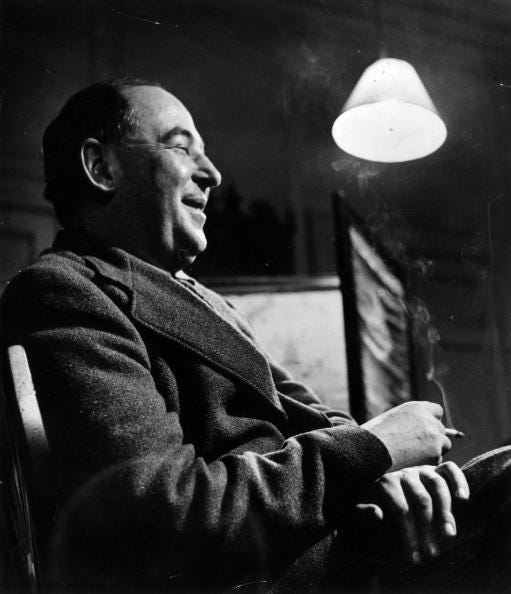There are only three kinds of things anyone need ever do...
C. S. Lewis generously writes to his young fans

Considering he wrote The Chronicles of Narnia, it’s no real surprise to learn that C. S. Lewis received thousands of letters from youngsters during his career. Less predictable is that he attempted to respond to all of them, and I don’t mean with an impersonal line or two, or a pre-printed “C. S. Lewis, of Narnia fame, regrets to announce that he has neither the time nor urge to reply properly to what was probably a nice piece of fan mail.” Nope. As far as I can tell, more often than not he responded with letters that could be charming, friendly, amusing, insightful, and comforting, sometimes all at once, and in 1985 (37 years ago!) a selection were reprinted in a book titled, C.S. Lewis: Letters to Children. And because today is the anniversary of Lewis’ birth, I thought I’d choose some of my favourite passages and send them to you. Enjoy.
Remember that there are only three kinds of things anyone need ever do. (1) Things we ought to do (2) Things we’ve got to do (3) Things we like doing. I say this because some people seem to spend so much of their time doing things for none of the three reasons, things like reading books they don’t like because other people read them. Things you ought to do are things like doing one’s school work or being nice to people. Things one has got to do are things like dressing and undressing, or household shopping. Things one likes doing—but of course I don’t know what you like. Perhaps you’ll write and tell me one day.
C. S. Lewis
Letter to Sarah
3rd April 1949
I think that looking for a “point” in [a story] may prevent one sometimes from getting the real effect of the story in itself—like listening too hard for the words in singing which isn’t meant to be listened to that way (like an anthem in a chorus). I’m not at all sure about all this, mind you: only thinking as I go along.
C. S. Lewis
Letter to Phyllida
18th December 1953
I’m tall, fat, rather bald, red-faced, double-chinned, black-haired, have a deep voice, and wear glasses for reading.
C. S. Lewis
Letter to a fifth grade class
29th May 1954
You are lucky that at your age you are having such lovely dreams: and how very well you describe them. This, I may add, is not just a compliment, I really mean that what you write is good. I do see your Coloured Mountains. When I was young, all my dreams were horrors—insects the size of small ponies which closed in upon me, etc.
C. S. Lewis
Letter to Joan
9th September 1954
I am thrilled to hear that your street runs North as well as South, because in this country all streets (and even country roads) run in two directions at the same time. They are trained to change the moment you turn around. What is even cleverer of them [is that] they turn their right side into their left side at the same time. I’ve never known it fail.
C. S. Lewis
Letter to Hugh
20th July 1955
I am sorry for you having been bandaged all those months. Did it itch dreadfully under the bandage where one can’t get at it? I know I did when I was bandaged for ages after my wound in the first war. But it’s lovely when at last you do get it off; seeing your own skin again is almost like meeting an old friend!
C. S. Lewis
Letter to Martin
25th March 1956
1. Always try to use the language so as to make quite clear what you mean and make sure your sentence couldn’t mean anything else.
2. Always prefer the plain direct word to the long, vague one. Don’t implement promises, but keep them.
3. Never use abstract nouns when concrete ones will do. If you mean “More people died” don’t say “Mortality rose.”
4. In writing. Don’t use adjectives which merely tell us how you want us to feel about the thing you are describing. I mean, instead of telling us a thing was “terrible,” describe it so that we’ll be terrified. Don’t say it was “delightful”; make us say “delightful” when we’ve read the description. You see, all those words (horrifying, wonderful, hideous, exquisite) are only like saying to your readers, “Please will you do my job for me.”
5. Don’t use words too big for the subject. Don’t say “infinitely” when you mean “very”; otherwise you’ll have no word left when you want to talk about something really infinite.
C. S. Lewis
Letter to Joan
26th June 1956
To begin with, may I congratulate you on writing such a remarkably good letter; I certainly could not have written it at your age. And to go on with, thank you for telling me that you like my books, a thing an author is always pleased to hear. It is a funny thing that all the children who have written to me see at once who Aslan is, and grown ups never do!
C. S. Lewis
Letter to Philip
21st November 1963
The letter to Philip was Lewis’ last. He died the next day, a week before his 65th birthday.



I love these! Thank you so much.
Love these